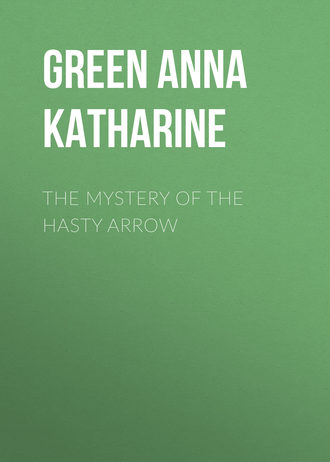
The Mystery of the Hasty Arrow
"I do not."
His tormentors went no further. Why harass him for an item of knowledge which the morrow would certainly bring to light. Instead, they hurried through the remaining formalities, adding to the reading already made a capitulation of such answers as he had given to their questions, and witnessing, while he signed both papers.
This done, he was left for a moment in peace, while the two officials drew aside into the embrasure of the window for a momentary conference.
He seemed to notice the hush, for he roused from the torpor into which he was again about to sink, and glanced cautiously about him. The stenographer was busy with his papers, and the other two stood with their backs to him. If help was to come it must come now. This he realized, with a sudden graying of his face which took from it the last vestige of that youthfulness which had been its distinguishing feature; and the finger which had fumbled from time to time in his vest-pocket stole thither once more, bringing forth a little vial which in another moment he raised to his lips.
Was there no one to see? No one to stop him?
No, the stenographer was closing up his bag; and the two officials deep in conversation. He could drain the last drop unseen.
But the sound of the little vial crashing upon the hearthstone whither he had flung it broke the quiet and startled the District Attorney forward in a doubt bordering upon terror.
"What is that?" he asked, pointing to the fragments that had just missed the ash heap.
"It contained oblivion," was the answer given him in steady tones. "Do you wonder that I sought it? Nothing can save me. I have two minutes before me. I would dedicate them to her."
His head fell forward on his hands. The clock on the mantel struck. Could it be that when the second hand had circled its small disc twice—
This was the thought of the District Attorney, but not of the Chief Inspector. He had advanced to the desk where Mr. Roberts was still sitting, and remarked with a gravity exceeding any he had hitherto shown:
"Mr. Roberts, I have a great disappointment for you. This little vial of yours which held poison yesterday contained nothing but a few drops of harmless liquid to-day. The change was made in the night, by one suspicious of your intention. You will have to face the full consequences of your crime."
Carleton Roberts' arms collapsed and his face fell forward upon them, and they heard a groan. Then in the short silence which followed, another and a very different sound broke upon their ears. Seven clear calls from the cuckoo-clock rang out from the room beyond, followed by a woman's smothered cry.
It was the one ironic touch the situation had lacked. It pierced the heart of Carleton Roberts and started him in anguish to his feet.
"O God!" he cried, "that I should have let that thing of evil shriek out the wicked hours from day to day, only to torment her now with old remembrances! Why did I not crush it to atoms long ago? Why did I leave it hanging on my wall–"
With a dash he was in the hall. In another instant he was at the door of his bedroom, followed by the two officials crowding closely up behind him.
Would they find her there? Yes; where else should she be, she whom this call from the past might almost draw from the grave! She was there, but not in the spot where they had expected to see her, nor in that state of collapse of which her former weakness had given promise. Apart from Mr. Gryce, with her form drawn up to its full height she stood, with her finger pointing not at the cuckoo-clock as would seem most natural, but at a small newspaper print of the dead girl's face pinned up on another wall.
"Why is that here?" she cried in a passionate inquiry which ignored every other presence than that of him who must heed and answer her. "Carleton, Carleton, why have you pinned that young girl's face up opposite your bed where you can see it on waking, where it can look at you and you at it—Or–" here checked by a sudden thought she broke off, and her tone changed to one of doubt, "perhaps you did not put it there yourself? Perhaps its presence on your wall is a trick of the police to startle you into betrayal. Was it? Was it?"
"No, Ermentrude." The words came slowly but firmly. "I put it there myself. I thought it would haunt me less than if left to my imagination."
Then in a low tone which perhaps reached no other ears than hers:
"I do not know what it does to me; or what I see in it. Something besides youth and beauty. Something–"
"Hush!" She had him by the arm. "Forget it; these men are listening–"
But with a convulsive movement, he broke from her hold, and in so doing his eyes fell on a mirror confronting him from the opposite side of the room. Two faces were visible in it, his own and that of his young victim pictured in the print hanging on the wall behind him. They seemed alive. Both of them seemed alive, and as he saw them thus in conjunction, the sweet, pure countenance of the child he had instinctively mourned, peering at him over his guilty shoulder—the sweat started on his forehead and he uttered a great cry. Then he stood still, swaying from side to side, the eyes starting from his head in a horror transcending all that had gone before.
"Take him away!" she cried. "Out of the room! Let him remain anywhere but here. I pray you; I entreat."
But he was not to be moved.
"Ermentrude," he whispered; "they say her name was Duclos. She gave her name as Willetts. What was her name? You know the truth and can tell me."
XXXIII
AGAIN THE CUCKOO-CLOCK
Then to the wonder and admiration of all, this extraordinary woman showed her full strength and the inexhaustible power she possessed over her own emotions. With a smile piteous in its triumph over a suffering the depths of which they were just beginning to sound, she held his gaze in hers and quietly said:
"You have driven me to the wall, Carleton. If I answer, nothing remains to us of hope or honor; nothing upon which to stay our souls but a consciousness of truth. Shall we let all go and meet our fate as people should who stand on a desolate shore and see the whole world roll away from before them?"
"What was her name?"
At his look, at this repetition of his question, she straightened up, and addressed herself to Mr. Gryce.
"You were astonished and regarded me curiously when at the sound of that foolish little clock I entered this room. That little clock means everything to me, gentlemen." Here she surveyed them one after the other with her proud and candid eye. "It is the one witness I have—is it not, Carleton?" she asked, turning quickly upon him. "You have not failed me in this?"
He shook his head.
"A witness to what I am still ready to ignore, if such is your will, Carleton."
Terror! terror far beyond anything they had seen in him yet, paled his cheek and made his face almost unrecognizable; but he could still speak, and in the murmur he let fall she heard no word of protest.
"May I ask one of you to take down that clock?"
In a few minutes it lay on the table to which she had pointed. Mr. Gryce who had at that moment in his pocket a copy of the inscription pasted on its back, expected her to turn it over and show them the token of Mr. Roberts' and her united initials.
But it was not this she had in mind. Though she took up the clock, she did not turn it round, only looked at it steadily, her trembling lips and a tear—the first they had seen—testifying to the rush of old memories which this simple little object brought back to her long suffering heart. Then she laid it down again and seemed to hesitate.
"I want to get at the works inside," she appealed to them with a helpless accent. "Can you tear off the back? That would be the quickest way. But no, I know a quicker," and lifting the clock again she turned it upside down and shook it.
They heard—what did they hear? No one could say, but when she again reversed it, there fell out upon the table and rolled to the floor a small gold circlet. Lifting it, Mr. Gryce held it out to her. Taking it, she carried it over to the District Attorney and placed it in his hand.
"Read the inscription inside."
He did so, and looking quickly up, said:
"This is a wedding ring! Yours! You believe yourself to have been married to him."
"I was married to him in Switzerland. The marriage was legal; he knows it, he acknowledges it, or why should he keep this ring. I have endured seeing him put another woman in my place. I have kept silence for years; but when he asks the right name of the child shot down in the museum, and asks it in a way which compels answer, then I must make known my rightful claims. For that child was not only mine, but his; born after he left me, and reared without his knowledge, first in this country and then in France."
And breaking down now utterly, she fell on her knees sobbing out her soul at the feet of him from whose honor she had torn the last poor, pitiful shred.
As for him, he said nothing; even his lips refused the smallest cry. Only his hand which had hung at his side went to his heart; and thus he stood swaying—swaying, till he finally fell forward into the arms she suddenly threw out to receive him.
"Carleton! Carleton!" she wailed, searching for consciousness in his fast glazing eye. "It was to show you your child that I made the appointment at the museum. Not for myself. Oh, not for myself, but for your sake, that you might have–"
Useless; all useless.
He was dead.
Would she have had it otherwise? Would any of them? When they were quite sure of the fact, she placed the ring in his still warm hand; then she solemnly put it on her finger, and turning, faced them all.
"Do not blame me too much for this final blow I gave him. He had already seen the truth in that mirror over there. His face—look at it and then at this picture of her taken after death, and see the resemblance! It is showing plainer every minute. It was the something which had worried and eluded him. Nothing could have kept back the truth from him after that one glimpse he caught of himself and her in the mirror. I loved him. Mine is the grief; you will let me stay here with him to-night. To-morrow I will answer all questions."
XXXIV
THE BUD—THEN THE DEADLY FLOWER
You who have read thus far will care little for the legalities which followed the events just related, but you may wish to know to a fuller extent some of the facts in Ermentrude Taylor's life which led to this tragic end of all her hopes.
Her story is twofold, the portion connecting her with Carleton Roberts being entirely dissociated from that which made her the debtor of Antoinette Duclos. Let me tell the latter first, as it preceded the other, and tell it in episodes.
Two girls stood at one end of a long walk of immemorial yews. At the other could be seen the advancing figure of a man, young, alert, English-clad but unmistakably foreign. They were school girls and bosom friends; he their instructor in French; the walk one attached to a well-known seminary. When they had entered this walk, it had been empty. Now it held for one of them—and possibly for the other, too—a world of joy and promise;—the world of seventeen. Innocent and unthinking, neither of them had known her own heart, much less that of her fellow. But when in face of that approach, eye met eye with an askance look of eager question, revelation came, crimsoning the cheeks of both, and marking an epoch in either life.
Noble of heart and tender each toward the other, they were yet human. Arm fell from arm, and with an equally spontaneous movement, they turned to search each the other's countenance, not for betrayal,—for that had already been made—but for those physical charms or marks of mental superiority which might attract the eye or win the heart of a man of the ideality of this one.
Alas! these gifts, for gifts they are, were much too unequally distributed between these two to render the balance at all even.
Ermentrude was handsome; Antoinette was not.
Ermentrude had besides, what even without beauty would have made her conspicuous to the eye, the figure of a goddess and the air of a queen. But Antoinette was small and had to feel secure and in a happy mood to show the excellence of her mind and the airy quality of her wit.
Then, Ermentrude had money and could dress, while Antoinette, who was dependent upon an English uncle for everything she possessed, wore clothes so plain that but for their exquisite neatness, one would never dream that she came from French ancestry, and that ancestry noble.
Yes, she had that advantage; rank was hers, but not the graces which should accompany it. More than that, she had nothing with which to support it. Better be of the yeoman class like Ermentrude, and smile like a duchess granting favors. Or so she thought, poor girl, as her meek regard passed from the friend whose attractions she had thus acknowledged to the man whose approbation would make a goddess of her too.
He was coming—not with his usual indifferent swing, but eagerly, joyously, as though this moment meant something to him too. She knew it did. Small memories rushing upon her, made no doubt of that. But why? Because of Ermentrude or because of herself? Alas! she could recall nothing which would answer that. They were much together; he had scarcely ever seen them separate. It might be either–Hardly alive from suspense, she watched him coming—coming. In a moment he would be upon them. On which would his eyes linger?
That would tell the tale.
In an anguish of ungovernable shyness, she slipped behind the ample figure of her friend till only her fluttering skirt betrayed her presence. Perhaps she was saved something by this move; perhaps not. She did not see the beam of joy sparkling in his eye as he greeted Ermentrude; but she could not but mark the heaviness of his step as he passed them by and wandered away into the shadows.
And that she understood. Ermentrude had not smiled upon him. To him, the moment had brought pain.
It was enough. Now she knew.
But why had not Ermentrude smiled?
A dormitory lighted only by the moon! Two beds close together; in one a form of noble proportions, and in the other the meagre figure of a girl almost buried from sight among pillows and huddled-up blankets. Both are quiet save for an occasional shudder which shakes the bed of the latter. Ermentrude lies like the dead, though the moonlight falls full upon her face blanching it to the aspect of marble. Even her lashes rest moveless on her cheek.
But she is not sleeping; she is listening—listening to the sobs, almost inaudible, which now and then escape from the beloved one at her side. As they grow fainter and fainter and gradually die away altogether till stillness reigns through the whole dormitory, she rouses and bending forward on her elbow, looks long and lovingly at the wet brow of her sleeping mate. She then sinks back again into rigidity, with a low moan, ending in the whispered words:
"He does not love,—not yet. A slight thing will turn him. Did I not see him glance back twice, and both times at her? The look with which she greeted him was so wonderful."
A village street in Britanny; a parish church in the distance; two women bidding each other farewell amid a group of wedding-guests, gay as the heavens are blue.
"Au revoir!" was the whisper breathed by the bride into the ear of the other. "Au revoir, my Ermentrude. May you have a happy year in Switzerland!"
"Au revoir! little Madame. You will be happy I know in those United States to which you are going."
And the tears stood in the eyes of both.
"You will write?"
"I will write."
But the bride did not seem quite satisfied. Glancing about and finding her young husband busy with his adieux, she drew her friend apart and softly murmured:
"There is something I must say,—something I must know, before the sea divides us. You remember the day we all left school and you went home and I came to Britanny? Ermentrude, Achille tells me that on that day he sought the whole house over for you till he came upon you in one of the classrooms; and that you whom I had sometimes seen so sad were very gay and told him between laughing and crying that you were bidding a solemn farewell to all the nooks and corners of the old seminary, because your fiancé awaited you at home, and there would be no coming back."
"I meant my music."
"He did not know that, Ermentrude," and here she laid her hands upon the other's shoulders, drawing back as she did so to look earnestly up into her face. "Was that done for me?"
They were too near for anything but the truth to pass from eye to eye. Ermentrude tried to laugh and utter a quick No, no! but the little bride was not deceived. Again upon her face there appeared that wonderful look of hers, which made her face for the moment verily beautiful, and unclasping her hands, she threw them about the other's neck, whispering in awed tones:
"Yet you loved him! loved him too!"
Then after a moment of silence dear to both their hearts, she drew back to give her friend one other look, and quietly said:
"His heart is mine now, Ermentrude, wholly and truly mine. And so you would have it be, I am sure. Life looks fair to me and very sweet; but however fair, however sweet, that life is yours if ever you want it and when you want it. The time may come—one never knows—when I can pay you back this debt. Till then, let there be perfect trust and perfect love between us. Give me your hand upon it—not just your lips—for I speak as men speak when they mean to keep their word."
Their eyes met, their hands clasped; then the bridegroom drew away his bride, and Ermentrude turned with bowed head and glistening eyes, to enter upon the new life awaiting her in ways she had yet to tread.
The second series of episodes opens with the meeting of a man and woman on a rustic bridge spanning a Swiss chasm. They are strangers to each other, yet both instinctively pause and a flush of intuitive feeling dyes the cheek of each.
The eternal, ever-recurring miracle has happened. He sees Woman for the first time, though he had thought himself in love before and had wandered thus far in an effort to forget. So, likewise, with her. She had had her fancies, or rather her one fancy; but when in strolling along this road ahead of her party she saw rising between her and the glorious landscape which had hitherto filled her eye the fine masculine head and perfect figure of Carleton Roberts, this fancy floated from her mind like the veriest thistledown, leaving it free to expand in fuller hopes and deeper joys than visit many women even when they think they love.
Alas! why in that instant of mutual revelation had not the further grace been given them of quick catastrophe shutting the door upon a future of which neither could then dream or sense the coming doom.
It was not to be.
He passed, she passed, and for the time the look they gave each other was all; but the world had been glorified for them both—and Destiny waited.
"Good looks? Yes; but nothing else; very ordinary connections, very. A little money, true. Her uncle, whom by the way I judge you have not seen, will leave her a few thousands; but meanwhile he is a fixture—will not leave her or let her leave him, which is a misfortune since in a social way he is simply impossible. No sort of match for you, Roberts. Cut and run while there is time; that's my advice to you, given in the most friendly spirit."
"Thank you. As I have but just met Miss Taylor, don't you think such advice is a little premature?"
"No, I don't. She is a woman who must be loved or left; that's all. You've heard me."
Did Carleton Roberts heed these words? No. What man in the thrall of his first romance ever did.
"You love me, Ermentrude?"
"I love you, Carleton."
"For a day, for a month or for a year?" he smiled.
"Forever," she answered.
"That's a long time," he murmured, with his eyes on a little clock hanging in the shop window before which they had stopped in one of their infrequent walks together. "A long time! That foolish little clock will beat out the hours of its short life and go the way of all things, before we shall hardly have entered upon the soul's 'forever.'"
"That clock will last our lifetime, Carleton. Afterward, love will not be counted by hours."
As she said this she turned her face his way and he saw it in its full flower with the light of heaven upon it. In later years he may have forgotten the emotions of that moment, but they were the purest, the freest from earthly stain that he was ever destined to know.
"I will love you forever," he whispered. "That little clock shall be my witness." And he drew her into the shop.
"Cuckoo!"
Ermentrude glanced up; the clock hung on her wall.
"Oh," she murmured, "each hour it will speak to me of him and his words," then softly, like one adream in Paradise:
"I love but thee,And thee will I love to eternity."Such was the event to her. What was it to him? Let us see:
A hotel room—a view of Pilatus, but with its top lost in enveloping clouds.
Seated before it with pen in hand above a sheet of paper, Carleton Roberts eyes these clouds but does not see them; he is hunting in his brain for words and they do not come. Why? His mother's name is on the page and he has only to write that she has been quite correct in her judgment as to the unfitness of the marriage he had had in mind:—that youth should mate with youth and that if she could see the glorious young girl whose acquaintance he had made here, she would be satisfied with his new choice which promised him the fullest happiness. Why then a sheet yet blank and a hesitating hand, when all it had to do was to write?
Who can tell? Man knows little of himself or of the conflicting passions which sway him this way or that, even when to the outward eye, and possibly to the inner one as well, action looks easy.
Did he feel, without its reaching the point of knowledge, that this mother of keenest expectation and highest hope would not be satisfied with what this charming but undeveloped girl of middle class parentage would bring him? Or was there, deep down in his own undeveloped nature, a secret nerve alive to ambitions yet unnamed, to hopes not yet formulated, which warned him to think well before he spoke the irrevocable word linking a chain which, though twined with roses, was nevertheless a chain which nothing on earth should have power to break.
He never sounded his soul for an answer to this question; but when he rose, the paper was still blank. The letter had not been written.
"I do not like secrecy."
"Only for a little while, Ermentrude. My mother is difficult. I would prepare her."
"And Uncle!"
"What of Uncle?"
"He made me take an oath to-day."
"An oath?"
"That I would not leave him while he lived."
"And you could do that?"
"I could do nothing else. He's a sick man, Carleton. The doctors shake their heads when they leave him. He will not live a year."
"A year? But that's an eternity! Can you wait, can I wait a year?"
"He loves me and I owe everything to him. Next week we go to Nice. These are days of parting for you and me, Carleton."
Parting! What word more cruel. She saw that it shook him, and held her breath for his promise that she should not be long alone. But it did not come. He was taking time to think. She hardly understood his doing this. Surely, his mother must be very difficult and he a most considerate son. She knew he loved her; perhaps never with a more controlling passion than at this moment of palpitating silence.
As she smiled, he caught her to his breast.
"We have yet a week," he cried, and left her hurriedly, precipitately.
It was their last ride and they had gone far—too far, Ermentrude thought, for a day so chilly and a sky so threatening. They had entered gorges; they had skirted mountain streams, had passed a village, left a ruined tower behind, and were still facing eastward, as if Lucerne had no further claims upon them and the world was all their own.
As the snows of the higher peaks burst upon their view, she made an attempt to stop this seeming flight.









